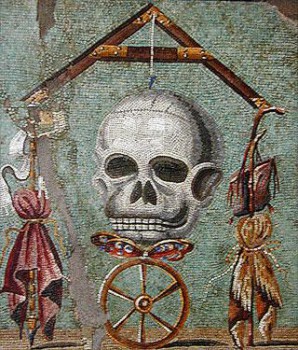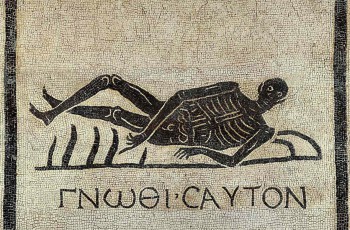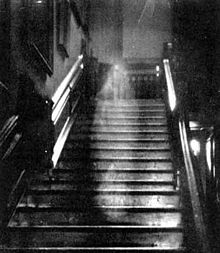Ancient Worlds: The Ghosts of the Past

I love a good ghost story.
And who doesn’t? Especially when the nights grow long, the trees grow bare, and the wind howls high up in the treetops. Like most people my age, I have cherished memories of huddling under the covers and reading Scary Stories to Tell in the Dark until I was too terrified to sleep.
(Anyone else vividly remember those drawings? The one with the girl and the spider bite? Just me? I’ll be over in the corner with my nightmare fuel…)
This is nothing new, of course. The Greeks and Romans loved a good ghost story as well. What’s amazing is just how astonishingly familiar they are.
Pliny the Elder famously tells this story about a haunted house:
“There was at Athens a large and spacious, but ill-reputed and pestilential house. In the dead of the night a noise, resembling the clashing of iron, was frequently heard, which, if you listened more attentively, sounded like the rattling of fetters; at first it seemed at a distance, but approached nearer by degrees; immediately afterward a phantom appeared in the form of an old man, extremely meagre and squalid, with a long beard and bristling hair; rattling the chains on his feet and hands. The poor inhabitants consequently passed sleepless nights under the most dismal terrors imaginable…

It happened that Athenodorus the philosopher came to Athens at this time, and reading the bill ascertained the price. The extraordinary cheapness raised his suspicion; nevertheless, when he heard the whole story, he was so far from being discouraged, that he was more strongly inclined to rent it, and, in short, actually did so. When it grew towards evening, he ordered a couch to be prepared for him in the forepart of the house, and after calling for a light, together with his pen and tablets, he directed all his people to retire within. But that his mind might not, for want of employment, be open to the vain terrors of imaginary noises and apparitions, he applied himself to writing with all his faculties.
The first part of the night passed with usual silence, then began the clanking of iron fetters; however, he neither lifted up his eyes, nor laid down his pen, but closed his ears by concentrating his attention. The noise increased and advanced nearer, till it seemed at the door, and at last in the chamber. He looked round and saw the apparition exactly as it had been described to him: it stood before him, beckoning with the finger. Athenodorus made a sign with his hand that it should wait a little, and bent again to his writing, but the ghost rattling its chains over his head as he wrote, he looked round and saw it beckoning as before. Upon this he immediately took up his lamp and followed it. The ghost slowly stalked along, as if encumbered with its chains; and having turned into the courtyard of the house, suddenly vanished. Athenodorus being thus deserted, marked the spot with a handful of grass and leaves. The next day he went to the magistrates, and advised them to order that spot to be dug up. There they found bones commingled and intertwined with chains; for the body had mouldered away by long Iying in the ground, leaving them bare, and corroded by the fetters. The bones were collected, and buried at the public expense; and after the ghost was thus duly laid the house was haunted no more. (Letters of Pliny, Book 7, Letter 27)
I love everything about this story: the rattling chains, the terrified inhabitants, the chained skeleton… but best of all, of course, is the utterly unflappable Athenodorus.
Apuleius, in his Metamorphoses (also known as The Golden Ass), tells a hair-curling tale that reads like a chapter out of The Ring. A woman has been caught having an affair, and when her husband throws her out of the house, she goes to see a witch. After magical attempts to reunite the woman with her husband are unsuccessful, she asks the witch to kill him instead.
Around the middle of the day a woman suddenly appeared in the mill… She was only semi-clothed by a pitiful piece of patchwork. Her feet were bare and uncovered. She was yellow like boxwood and foully emaciated. Her unkempt hair was partially grey and caked in the ashes that had been scattered over it. It hung down and covered most of her face. In this state as she was, she reassuringly put her hand on the miller as if she wished to share something with him in secret. She drew him aside to his room and, with the door put to, stayed there for an awfully long time. But when the workers had processed all the grain they had to hand, and a further supply inevitably had to be sought, the boys came to the room and called on their master… they shouted out repeatedly and frequently, but no master responded to them. They began to beat more vigorously on the door. It had been carefully bolted… with a stout shove they pushed it out and at last opened a way for themselves. There was no sign of the woman, but their master was there to be seen hanging by a noose from a beam and already dead. (9.30, tr. Daniel Ogden)

The story is masterfully told, in part because we are left with questions. How did the ghost kill the miller? Did she terrify him into suicide? Overpower him? Why did the miller go with a woman who was so obviously a corpse?
Between the two stories, the second is the more frightening. In part, it’s because one has a happy ending and one doesn’t. A ghost who’s willing to hold off the moaning while you finish a paragraph is inherently less scary than the one who leaves you swinging from the rafters. But it’s also because it leaves us with so much that we just don’t know or understand. Ghost stories are scary because they’re about the unknown and the unknowable.
Because they’re about The Great Unknowable. Knowing the details, figuring out the why of the haunting satisfies our curiosity and simultaneously makes it less scary. But whether you like your ghost stories solved like a cozy mystery or left raw and gaping, you’re not alone: these stories have delighted and terrified us for at least 2600 years.
What’s your favorite scary story to tell on a dark night?